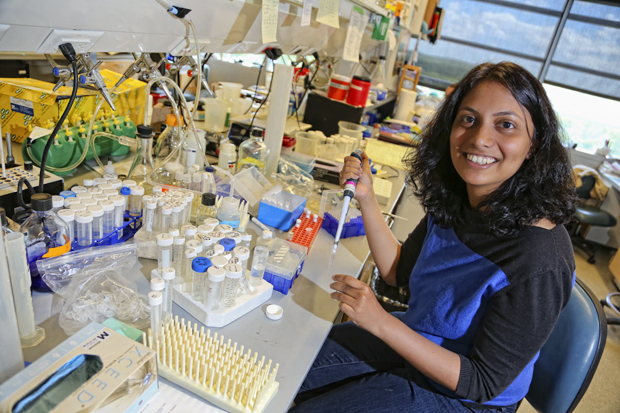Looking at the role of the protein TDP-43 in ALS
A postdoctoral fellow will examine the protein's effects in human cells.

In ALS, also known as Lou Gehrig’s disease, the body’s motor neurons degenerate and eventually die. As a result, muscles waste away, leading to an inability to speak, move and, eventually, breathe. Patients typically die within five years of symptom onset.
One possible target for a drug treatment for ALS is the protein TDP-43. Mutations in the gene encoding TDP-43 cause some cases of inherited ALS and almost all sufferers of sporadic ALS to develop clumps of TDP-43 protein in their neurons.
In recent years, postdoctoral fellow Mugdha Deshpande has been working with associate professors of biology Avital Rodal and Suzanne Paradis to uncover how the TDP-43 protein damages neurons in model organisms such as the fruit fly Drosophila melanogaster. Now, they want to take the next step and see whether the same effects occur in human cells.
Deshpande is the Blazeman Postdoctoral Fellow for ALS Research, a position funded by the Rhode Island-based Blazeman Foundation for ALS. Based on her discoveries of how TDP-43 affects neurons in model organisms, she recently received a Brandeis Provost Research award to further her research on TDP-43 in human cells.
Deshpande’s research focuses on motor neurons, whose nuclei are located in the spinal cord and whose nerve fibers, or axons, stretch throughout the body. In flies, defective TDP-43 has been shown to cause damage in the area where axons connect to muscles.
To test whether the same defects occur in humans, Deshpande will utilize a line of induced pluripotent stem cells isolated from an ALS patient’s skin cells and developed at the University of Massachusetts Medical School. In collaboration with the Human Neuron Core at Boston Children's Hospital, she will transform the stem cells into neurons.
Deshpande plans to study the defects that arise when human neurons develop while harboring a genetic mutation in the TDP-43 gene. “We need to gain an understanding of what’s going on,” she says. “Without that, we are not going to get a therapy” for ALS.
Categories: Research, Science and Technology





